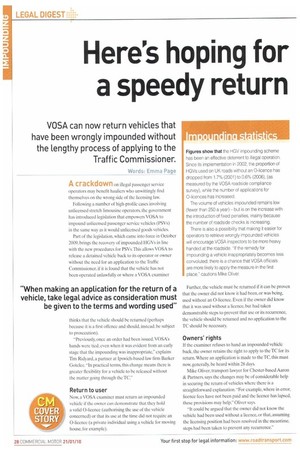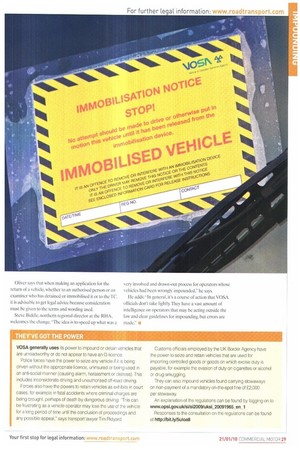Here's hoping for a speedy return
Page 28

Page 29

If you've noticed an error in this article please click here to report it so we can fix it.
VOSA can now return vehicles that have been wrongly impounded without the lengthy process of applying to the Traffic Commissioner.
Words: Emma Page A crackdown on illegal passenger service operators may benefit hauliers who unwittingly find themselves on the wrong side of the licensing law.
Following a number of high-profile cases involving unlicensed stretch limousine operators, the government has introduced legislation that empowers VOSA to impound unlicensed passenger service vehicles (PSVs) in the same way as it would unlicensed goods vehicles.
Part of the legislation. which came into force in October 2009, brings the recovery of impounded HGVs in line with the new procedures for PSVs. This allows VOSA to release a detained vehicle back to its operator or owner without the need for an application to the Traffic Commissioner, if it is found that the vehicle has not been operated unlawfully or where a VOSA examiner thinks that the vehicle should be returned (perhaps because it is a first offence and should, instead, be subject to prosecution).
"Previously, once an order had been issued,VOSA's hands were tied, even when it was evident from an early stage that the impounding was inappropriate," explains Tim Ridyard, a partner at Ipswich-based law firm Barker Gotelee."In practical terms, this change means there is greater flexibility for a vehicle to be released without the matter going through the TC."
Return to user
Now, a VOSA examiner must return an impounded vehicle if the owner can demonstrate that they hold a valid 0-licence (authorising the use of the vehicle concerned) or that its use at the time did not require an 0-licence (a private individual using a vehicle for moving house, for example). Further, the vehicle must be returned if it can be proven that the owner did not know it had been, or was being, used without an 0-licence. Even if the owner did know that it was used without a licence, but had taken demonstrable steps to prevent that use or its recurrence, the vehicle should be returned and no application to the TC should be necessary.
Owners' rights
If the examiner refuses to hand an impounded vehicle back, the owner retains the right to apply to the TC for its return. Where an application is made to the TC, this must now, generally, be heard within 28 days.
Mike Oliver, transport lawyer for Chester-based Aaron & Partners, says the changes may be of considerable help in securing the return of vehicles where there is a straightforward explanation. "For example, where in error, licence fees have not been paid and the licence has lapsed, these provisions may help," Oliver says.
-It could be argued that the owner did not know the vehicle had been used without a licence, or that, assuming the licensing position had been resolved in the meantime, steps had been taken to prevent any recurrence."
Oliver says that when making an application for the return of a vehicle, whether to an authorised person or an examiner who has detained or immobilised it or to the TC, it is advisable to get legal advice because consideration must be given to the terms and wording used.
Steve Riddle, northern regional director at the RHA, welcomes the change. "The idea is to speed up what was a very involved and drawn-out process for operators whose vehicles had been wrongly impounded," he says.
He adds: "In general, it's a course of action that VOSA officials don't take lightly. They have a vast amount of intelligence on operators that may be acting outside the law and clear guidelines for impounding, but errors are made." •




































































































































